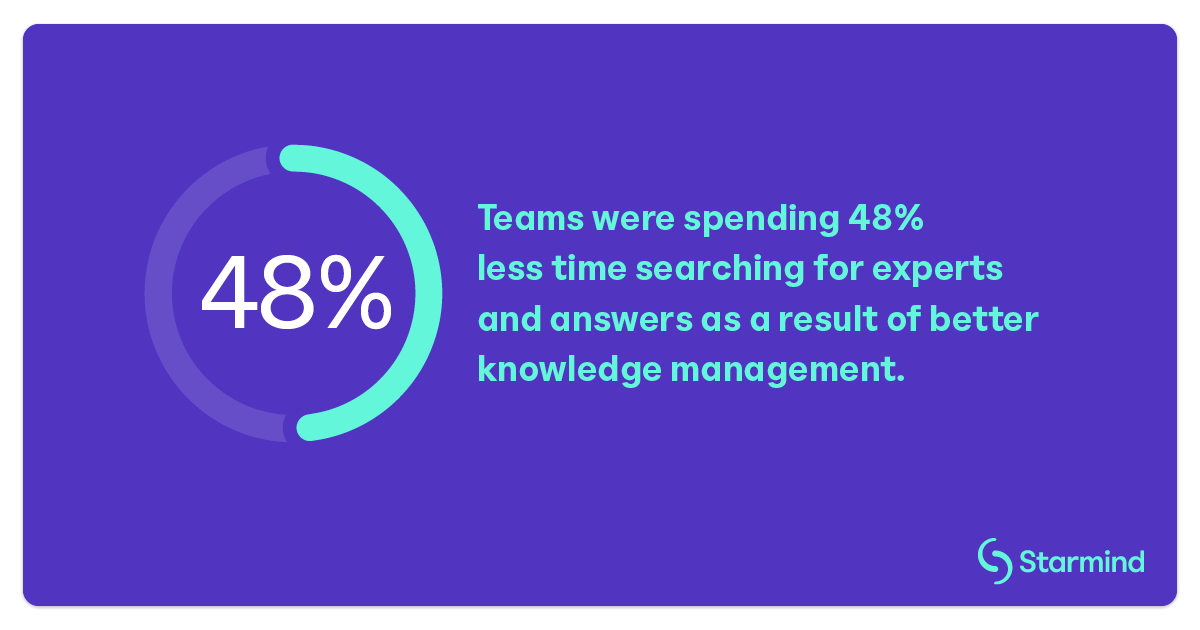Contents
Healthcare continues to evolve as new threats emerge and new technologies become available. Effective knowledge management for healthcare organizations can be the difference maker when helping patients, achieving lab breakthroughs or getting life-saving medicines to market.
Healthcare organizations want to provide patients with the highest quality of care and find new ways to solve or prevent problems. Modern knowledge management for healthcare teams can provide quick and accurate information, empower decision-making and offer expert support for employees and patients alike. Learn why knowledge management is essential and how healthcare organizations can use it better.
Why Is Knowledge Management Important in Healthcare?
One of the healthcare sector’s biggest challenges is delivering top-quality care and research in a pressure-packed environment where time is of the essence. It’s important to eliminate roadblocks that prevent your teams from focusing on their most important work.
One significant barrier is the time spent searching for information or trying to answer questions. Your healthcare research and development team has knowledge gained through hard-earned experience, but that can be difficult to capture and share easily. Teams can spend hours trying to find inaccessible or undocumented answers. Likewise, your employees can struggle to locate their peers who already know the answers.
Another challenge for healthcare research and development teams is that they often work in specialties and concentrations. While these smaller teams might frequently communicate at a high level of detail, their knowledge can become locked in silos if those employees don’t share their knowledge outside the group.
Using a modern approach to AI in knowledge management can save you time associated with finding and sharing knowledge while improving the quality of that knowledge and your workforce’s output. Your teams can learn and build from each other’s success without reinventing the wheel, which encourages collaboration and accelerates innovation.
6 Benefits of Knowledge Management In Healthcare
Healthcare has unique opportunities and challenges because of its focus on people. Your employees need access to specialized knowledge about specialties and a broad range of services. The stakes are higher because the outcomes can literally be life-altering.
Here are a few ways knowledge management helps you provide a great experience for patients, clients and employees while making your organization more productive.
Boosts Operational Efficiency
Sharing knowledge easily can improve operational efficiency. For example, more than two-thirds of knowledge workers say projects have been delayed due to missing information. For R&D teams bringing a new medicine to market, any delay could cost lives, not to mention millions of dollars and the loss of exclusivity.
Sales teams can also benefit from improved efficiency through knowledge management. With easy access to information, salespeople can answer customers’ questions quickly. This accelerates sales cycles and frees representatives up to seek new business.
Enables Self-Resolution
Organizations that install a knowledge sharing platform with supportive, easily accessible information can offer teams, customers and patients the ability to find the answers they need. This is particularly important for employees, who can get stuck waiting for answers instead of moving forward with critical tasks.
For larger or more complicated issues, your employees also need ready access to expert medical professionals for guidance. When employees don’t find enough information to solve the problem alone, internal experts can be consulted through the knowledge management system for a timely, trustworthy response. A modern knowledge system also structures this process so a few well-known experts aren’t overwhelmed by repetitive or irrelevant requests.
Promotes Collaboration
Healthcare employees often need multiple sources of information to make informed decisions in complex, life-altering situations. Important work such as addressing patient health, reviewing medical information and managing sensitive data can involve multiple teams, each needing to communicate clearly.
An effective knowledge management strategy helps these teams easily communicate, share their knowledge and collaborate with colleagues to drive value. When employees across groups can collaborate while referencing a shared source of information, they’ll resolve issues faster and break down knowledge silos in your organization. In addition, subject matter experts from any area of the enterprise can contribute their knowledge, which improves customer service, product development and innovation.
Supports Continuous Learning
Healthcare employees require continuous learning opportunities. A modern knowledge system offers relevant and accurate information that is regularly reviewed and updated.
Healthcare practitioners must constantly update their knowledge based on new research, innovation and regulations. They can’t waste time searching for the latest information or worry that what they uncover is accurate.
R&D teams, for example, also benefit from being able to keep up with the latest industry developments through a trusted source of information. These teams focus on innovation but need a complete picture of existing knowledge, especially internally, so they don’t create duplicative research or outcomes.
Continuous learning can also improve internal training and how you communicate new policies and procedures, especially across the enterprise. When your team members understand their roles and expectations, they can focus on what matters most and operate with the most timely and relevant information.
Eliminates Knowledge Gaps
For many companies, the shift to remote or hybrid work has further highlighted the challenge of knowledge silos and gaps.
Organizations often find valuable, top-performing employees focusing their attention and effort on a single project or team. This mindset can create knowledge gaps because these employees lack the full scope of information available across the enterprise. In turn, these siloed employees struggle to share their knowledge with the rest of the organization. This adds to undocumented and inaccessible information, slowing employees down and frustrating their efforts.
Instead of limiting knowledge sharing and success to a single group, knowledge management can make this information accessible to everyone. Team members who need assistance can quickly find the latest information or connect with knowledgeable co-workers.
Stimulates Innovation
Innovation requires focus and ample time for iteration. Teams need real-time access to critical knowledge and subject matter experts so they aren’t waiting for answers. They also need to know what information exists so they aren’t duplicating work.
When R&D teams also contribute to knowledge management platforms, they further fuel innovation because everyone else benefits from this contributed expertise.
 4 Tips for Modern Knowledge Management in Healthcare
4 Tips for Modern Knowledge Management in Healthcare
Make the Most of Visuals
Even for those with years of experience, reviewing and learning healthcare information can quickly become overwhelming. Help encourage learning and knowledge sharing by incorporating informative visuals into your knowledge base, especially to supplement or explain technical terminology and complex topics.
Create a Knowledge-Sharing Culture
One of the most important aspects of knowledge management is employee engagement. Employees should be excited to share their knowledge; the easiest way to unlock that energy is to make sharing easy.
Incorporate knowledge sharing into everyday workflows to make it a natural part of daily processes. As you begin to capture and analyze knowledge, identify areas of your business where employees need the most support, and note which employees are adding value by contributing and sharing. Over time, this culture of sharing knowledge self-reinforces. Employees see the benefits and want to contribute.
Collect Feedback
Engagement and performance reports can be beneficial for getting an idea of how your team works with your knowledge management platform. However, such data should be supplemented with employee feedback.
For example, after Dräger used the Starmind platform to make it faster and easier for its teams to connect with important knowledge, the company needed to analyze the effectiveness of its knowledge-sharing efforts. Reporting from the platform indicated that in the first 15 months since implementation, over 6,300 questions were asked and answered. On average, those same answers were reused more than five times each.
Feedback from employee surveys, however, helped translate the time spent on these questions and answers into a 12-percentage-point increase in effective working time. Due to better knowledge management, teams spent 48% less time searching for experts and solutions.
Develop a Knowledge Map
Develop a knowledge map — a visual representation of your organization’s knowledge and where it resides — to identify gaps in knowledge and better understand how knowledge flows in your organization. Knowledge maps allow you to identify and categorize knowledge assets. Then, you can begin to form connections across these assets.
Making the Most of Your Knowledge
Healthcare continues to evolve rapidly, which is good for humanity but also puts pressure on employees to continuously digest and access large amounts of information. Because your work directly affects the health of your clients, you need access to the most accurate, up-to-date information available when making patient decisions, innovating or closing sales.
Modern knowledge management helps at the organizational level, too. Teams are more aligned and contribute more to overall goals when they can find information quickly. A healthcare knowledge management system like Starmind accelerates innovation for your R&D teams and shortens sales cycles by breaking down knowledge silos and making it easier to find the resources teams need to do their work.
Knowledge management for healthcare empowers employees to self-resolve problems and share their expertise so co-workers can find answers quickly instead of reinventing the wheel. Get started today to see how your entire organization can become more efficient and productive.
Learn more about modern knowledge management, and discover the benefits of knowledge management systems.



